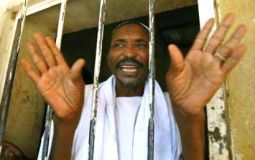US lobbying for new court for war crimes in Darfur
By Evelyn Leopold
UNITED NATIONS, Jan 26 (Reuters) – The United States is urging key U.N. Security Council members to set up a new court for perpetrators of atrocities and killings in Sudan’s Darfur region, setting itself up for a showdown with Europeans.

|
|
Hadj Suleiman, one of six arrested Sudanese men, shouts from a cell inside the court in Nyala, September 30, 2004. (Reuters). |
Senior diplomats said U.S. envoys had once again raised the issue of a court again this week, to avoid any referral by Europeans to the International Criminal Court, ICC, a tribunal the Bush administration vehemently opposes.
A future court for Darfur has not yet been put on paper as part of a council resolution U.S. officials want that would impose an arms embargo in Darfur and a travel ban and assets freeze against those suspected of war crimes.
But despite disagreement over the court, Western envoys are frustrated by general inaction in the council as the Darfur conflict goes on, with new fighting last week that may have killed 150 civilians and displaced more than 9,000.
Pro-government militia are blamed for killings, rape and pillaging in Darfur. Some 1.8 million villagers have been left homeless, 70,000 are estimated to have died and rebels have looted relief trucks and attacked police stations.
The main bulwark against a wider war is the African Union, which has promised more than 3,000 troops and monitors for Darfur but has not been able to put more than a third of them in the field and needs outside help.
The Hague-based ICC came into existence a year ago as the first permanent global criminal court to try individuals for genocide, war crimes and massive human rights abuses.
Europeans, who bear the main cost of the tribunal, refuse to help subsidize another court with the same purpose but the Bush administration has mounted a campaign against the court, fearing frivolous lawsuits against U.S. soldiers abroad.
One suggestion by the United States is to empower the ad hoc tribunal in Tanzania hearing genocide cases on Rwanda to include the Darfur cases also, a Bush administration official and diplomats said. But EU members so far reject this also.
Among the 15 council members, nine have ratified the treaty establishing the court. The others, except for the United States and China, have signed the pact.
KEY U.N. REPORT
The discussions this week among the five permanent council members with veto power — the United States, Britain, France, Russia and China — are in advance of a report by a U.N. commission, whose findings are expected to be made public next week.
The commission of legal experts may recommend that the council refer the case to the ICC. The report is expected to detail war crimes in Darfur but not necessarily call them genocide. The commission may also include a sealed list of those responsible for the crimes among government officials, local leaders and rebels, diplomats said.
The United States has not drawn up a text for a resolution but presented “elements” on an arms embargo and sanctions to the five Security Council powers this week. The proposals include agreement for a planned U.N. peacekeeping force of about 10,000 for southern Sudan, where Khartoum and rebels recently signed a landmark peace pact.
“We’ve circulated objectives, not the exact language,” said Richard Grenell, spokesman for the U.S. mission to the United Nations, including holding “the parties accountable for what is going on in Darfur.”
To date the Russia, which has delivered military hardware to Sudan, and China, which has oil interests, have refused any penalties against Khartoum and said they would do so again.
But Western envoys are hoping that continued world criticism of inaction by the council would persuade both countries to at minimum agree to an arms embargo in Darfur, which Britain hopes will extend to the entire country.
